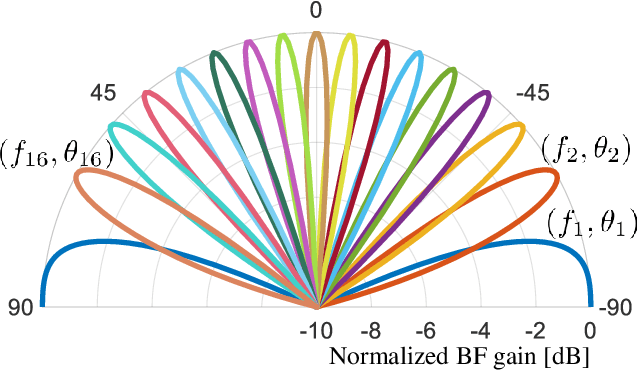Soumen Mohapatra
Wideband Beamforming with Rainbow Beam Training using Reconfigurable True-Time-Delay Arrays for Millimeter-Wave Wireless
Nov 30, 2021



Abstract:The decadal research in integrated true-time-delay arrays have seen organic growth enabling realization of wideband beamformers for large arrays with wide aperture widths. This article introduces highly reconfigurable delay elements implementable at analog or digital baseband that enables multiple SSP functions including wideband beamforming, wideband interference cancellation, and fast beam training. Details of the beam-training algorithm, system design considerations, system architecture and circuits with large delay range-to-resolution ratios are presented leveraging integrated delay compensation techniques. The article lays out the framework for true-time-delay based arrays in next-generation network infrastructure supporting 3D beam training in planar arrays, low latency massive multiple access, and emerging wireless communications standards.
A 4-Element 800MHz-BW 29mW True-Time-Delay Spatial Signal Processor Enabling Fast Beam-Training with Data Communications
Jun 02, 2021



Abstract:Spatial signal processors (SSP) for emerging millimeter-wave wireless networks are critically dependent on link discovery. To avoid loss in communication, mobile devices need to locate narrow directional beams with millisecond latency. In this work, we demonstrate a true-time-delay (TTD) array with digitally reconfigurable delay elements enabling both fast beam-training at the receiver with wideband data communications. In beam-training mode, large delay-bandwidth products are implemented to accelerate beam training using frequency-dependent probing beams. In data communications mode, precise beam alignment is achieved to mitigate spatial effects during beam-forming for wideband signals. The 4-element switched-capacitor based time-interleaved array uses a compact closed-loop integrator for signal combining with the delay compensation implemented in the clock domain to achieve high precision and large delay range. Prototyped in TSMC 65nm CMOS, the TTD SSP successfully demonstrates unique frequency-to-angle mapping with 3.8ns maximum delay and 800MHz bandwidth in the beam-training mode. In the data communications mode, nearly 12dB uniform beamforming gain is achieved from 80MHz to 800MHz. The TTD SSP consumes 29mW at 1V supply achieving 122MB/s with 16-QAM at 9.8% EVM.
 Add to Chrome
Add to Chrome Add to Firefox
Add to Firefox Add to Edge
Add to Edge